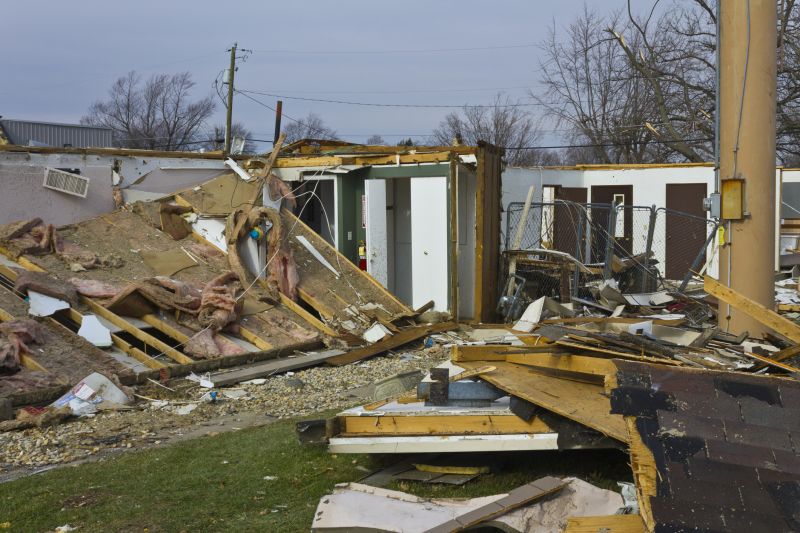Leading Supplies for Complete Roof Damage Restoration
Equip yourself with trusted products that support thorough and efficient roof restoration efforts after damage incidents.
 Restoring a roof after damage requires a careful selection of products designed to address various issues such as leaks, cracks, and material deterioration. The process often involves assessing the extent of the damage and choosing appropriate repair materials that can effectively seal, reinforce, and protect the roof structure. Common repair products include sealants, patching compounds, and waterproofing solutions, each tailored to specific types of damage and roofing materials. Proper application of these products can help extend the lifespan of a roof and prevent further deterioration.
Restoring a roof after damage requires a careful selection of products designed to address various issues such as leaks, cracks, and material deterioration. The process often involves assessing the extent of the damage and choosing appropriate repair materials that can effectively seal, reinforce, and protect the roof structure. Common repair products include sealants, patching compounds, and waterproofing solutions, each tailored to specific types of damage and roofing materials. Proper application of these products can help extend the lifespan of a roof and prevent further deterioration.
Top Overall Option
Comprehensive Roof Repair Kit
A versatile repair kit that includes a selection of sealants, patches, and waterproof coatings designed to address a wide range of roof damage scenarios. Ideal for DIY enthusiasts and professionals alike, it provides all necessary components for effective restoration, ensuring compatibility with various roofing materials and weather conditions.
Types of Products For Roof Damage Restorations
Roof Sealants
Flexible sealants used to fill cracks and seal joints, providing a waterproof barrier that adapts to roof movements.
Roof Patching Compounds
Ready-to-use compounds for patching holes and cracks in roofing materials, suitable for quick repairs.
Liquid Roof Coatings
Elastomeric coatings that form seamless, waterproof layers over damaged or vulnerable roof areas.
Roof Membranes
Self-adhesive or mechanically fastened membranes used to create a waterproof barrier on flat or low-slope roofs.
Underlayment Materials
Protective layers installed beneath roofing materials to provide additional waterproofing and protection.
Roof Repair Tapes
Adhesive tapes designed for quick sealing of minor leaks and cracks, easy to apply and remove.
Storm Damage Repair Kits
Specialized kits containing multiple products for addressing storm-related roof damage efficiently.
Waterproofing Sprays
Spray-on solutions that provide a water-resistant layer to protect roofing surfaces from moisture intrusion.
Roof Cleaning Agents
Cleaning solutions designed to remove moss, algae, and debris to maintain roof integrity and prepare surfaces for repairs.
Flashing Repair Components
Materials used to repair or replace flashing around chimneys, vents, and roof penetrations to prevent leaks.
Fire-Resistant Coatings
Specialized coatings that enhance fire resistance on roofing surfaces, providing added safety.
Insulation Repair Products
Materials for restoring or replacing insulation in attic or roof spaces to improve energy efficiency.
Popular Choices
Widely used for sealing leaks and cracks in various roofing materials, offering ease of application.
Convenient for quick fixes on minor damage, providing a temporary or semi-permanent seal.
Popular for their flexibility and waterproofing properties, suitable for various roof types.
Easy-to-install membranes that create a durable waterproof layer over damaged roof sections.
Sprayable solutions for quick sealing and waterproofing of roof surfaces, especially in hard-to-reach areas.
Complete kits designed for rapid response to storm-related roof damage, including multiple repair components.
Popular for maintaining roof surfaces and preparing them for repairs or coatings.
Essential for fixing or replacing flashing around roof penetrations to prevent leaks.
Commonly used for quick waterproofing on various roofing surfaces, easy to apply.
Popular for restoring attic insulation to improve energy efficiency and prevent moisture issues.
Roof damage restoration products are available in a wide range of formulations to suit different needs. For minor leaks or cracks, flexible sealants and patching tapes are frequently used for quick fixes. For more extensive damage, liquid coatings and waterproof membranes provide a more comprehensive solution, creating a durable barrier against water intrusion. When selecting products, it is important to consider compatibility with existing roofing materials, ease of application, and the level of protection offered.
In addition to repair-specific products, maintenance items such as roof coatings and cleaning agents play an important role in restoration. Regular application of protective coatings can help prevent future damage caused by weathering and UV exposure. It is also crucial to choose products that are safe to apply in various environmental conditions and that adhere well to different roofing surfaces. Properly selected and applied products can significantly improve the resilience of a roof and contribute to a safer, more secure building structure.
Overall, understanding the variety of available products and their appropriate uses helps ensure effective roof damage restoration. Whether dealing with minor repairs or more extensive restoration projects, the right products can make a significant difference in achieving a durable, long-lasting repair. Consulting with professionals or thoroughly researching product specifications can further assist in making informed choices tailored to specific roofing needs.
Key Buying Considerations
- Compatibility with existing roofing materials to ensure proper adhesion and performance.
- Type of damage being repaired, such as leaks, cracks, or material deterioration.
- Ease of application, especially if DIY installation is intended.
- Weather resistance and durability of the product under local climate conditions.
- Flexibility of sealants and coatings to accommodate roof movements and expansion.
- Coverage area provided by the product to determine the quantity needed.
- Vapor permeability to prevent trapping moisture beneath coatings or patches.
- Application temperature range to ensure effective use in your environment.
- Safety data and handling instructions for proper and safe application.
- Compatibility with other repair products or coatings already in use.
- Long-term protection features and resistance to UV exposure.
- Ease of removal or reapplication if future repairs are needed.
- Cost and availability in local stores or online suppliers.
- Manufacturer or supplier reputation for quality and reliability.
- Environmental conditions such as wind or rain that may affect application timing.
